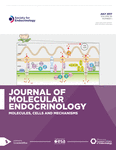Emerging functional roles of nuclear receptors in breast cancer
- T Doan, Centre for Cancer Research, Westmead Institute for Medical Research, Westmead, Australia
- J Graham, Centre for Cancer Research, Westmead Institute for Medical Research, Westmead, Australia
- C Clarke, Centre for Cancer Research, Westmead Institute for Medical Research, Westmead, Australia
- Correspondence: Tram Doan, Email: tram.doan{at}sydney.edu.au
Abstract
Nuclear receptors (NRs) have been targets of intensive drug development for decades due to their roles as key regulators of multiple developmental, physiological and disease processes. In breast cancer, expression of the estrogen and progesterone receptor remains clinically important in predicting prognosis and determining therapeutic strategies. More recently, there is growing evidence supporting the involvement of multiple nuclear receptors other than the estrogen and progesterone receptors, in the regulation of various processes important to the initiation and progression of breast cancer. We review new insights into the mechanisms of actions of NRs made possible by recent advance in genomic technologies and focus on the emerging functional roles of NRs in the regulation of selected facets of breast cancer biology beside proliferation, including their involvement in circadian regulation, metabolic re-programming and breast cancer migration and metastasis.
- Received 26 April 2016
- Revision received 13 December 2016
- Accepted 12 January 2017
- Accepted Preprint first posted online on 13 January 2017











